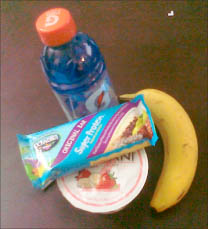“I’m going to drink my dinner tonight” is not an uncommon thing to hear around a college campus. Health-conscious students recognize the carb load of alcohol, and how it can quickly add up to the freshman 15. Rather than pursue a healthy diet, many students — typically women — starve themselves during the day, forgoing food and nutrition in attempts to offset the calories in the alcohol they consume at parties.
This practice has become known as “drunkorexia.” While not an official medical term, it has become widely used and recognized. Covered in a March article of the New York Times, the phenomenon is defined as: “self-imposed starvation or bingeing and purging, combined with alcohol abuse.”
“Binge drinking is almost cool and hip,” said Doug Bunnell, the past president of the National Eating Disorders Association, in the New York Times article. “And losing weight and being thin is a cultural imperative for young women in America. Mixing both is not surprising.”
Binge drinking on its own poses serious health risks. When excessive amounts of alcohol are consumed, your brain is deprived of oxygen. According to the Substance Abuse and Mental Health Services Administration, “the struggle to deal with an overdose of alcohol and lack of oxygen will eventually cause the brain to shut down the voluntary functions that regulate breathing and heart rate.”
When combined with a low or zero-calorie diet, the effects of binge drinking become much more dangerous. The food in your stomach acts as a sponge, absorbing the alcohol you drink. If there is no food in

your stomach, there is nothing to curb the amount of alcohol that goes into your system.
As a result, your blood alcohol level is likely to shoot up without your realizing it. Drunk and under-fueled from your restrictions during the day, you are also likely to go well beyond your limit before you realize the full effects the alcohol is having on your body. Drinking on an empty stomach not only jeopardizes your health, it greatly reduces your self-control — you are more apt to make bad decisions and put your health at risk.
Rather then starve yourself and run the risk of bodily harm, continue to eat throughout the day. Eating small meals every two to three hours not only keeps you satisfied, but will ultimately add up to fewer calories. These mini-meals keep your metabolism running smoothly – if you starve yourself and then take in a large number of calories at once, your metabolism gets thrown off. You are more likely to hold onto the calories after a day of not eating than if you had been eating regularly.
To avoid putting yourself through the negative side effects of restricted eating and binge drinking, stay fueled and practice smart drinking habits. Eat a number of small, healthy meals during the day. And once you are out, don’t rush into drinking before you can stop at your limit. You’ll feel better for having eaten, and thank yourself the next morning.
If you think you need help with your relationship with food or alcohol, please contact Student Health Services. They can set you up with professional staff from the Alcohol and Drug Educatiion Program and Counseling and Psychological Services. For more information, visit the Student Health Services website at tcnj.edu/~sa/health/
Andrea Thyrring can be reached at thyrrin2@tcnj.edu.






